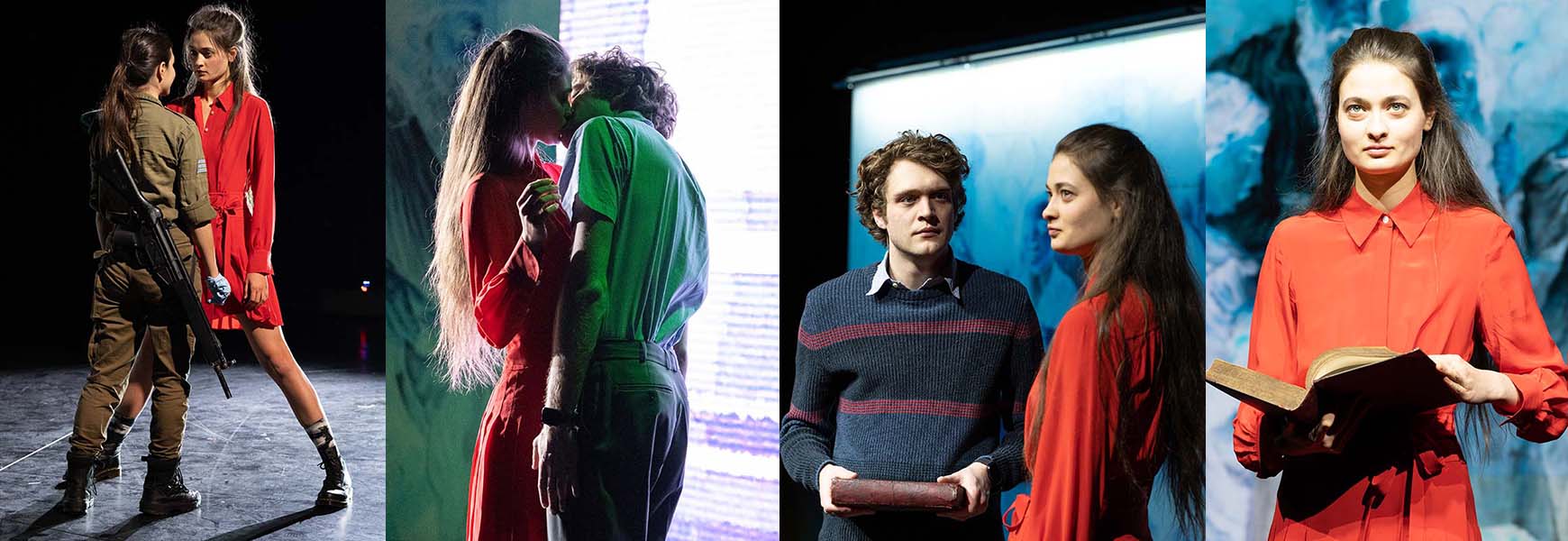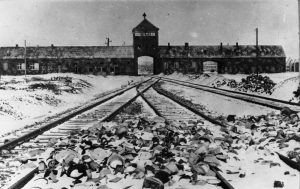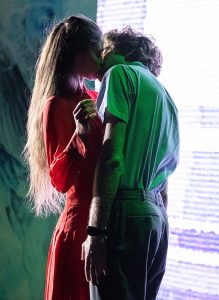„Vögel“ – Eine Frage der Identität – im Berliner Ensemble
Von Holger Jacobs
01.02.2022
Wertung 🙂 🙂 🙂 🙂 🙂 (fünf von fünf)
Welch ungeheure Bedeutung die Identität für uns Menschen hat ist das Thema dieses beeindruckenden Theaterstücks von Wajdi Mouawad.
Prolog
Als ich nach meinem Abitur Ende der siebziger Jahre zum Studium der Rechtswissenschaft nach München kam und im Fernsehen (in unserem Internat war damals Fernsehen verboten) den erbitterten Kampf zwischen Palästinensern und Israelis sah, verstand ich zunächst nichts von diesem Konflikt. In der Schule war unser Geschichtsunterricht mit dem 2. Weltkrieg beendet worden und der Nahost-Konflikt mit dem Sechstagekrieg und dem Jom-Kippur-Krieg in Israel waren für mich bis dahin unbekannt. Erst durch die intensive Lektüre von Tageszeitungen und Fachliteratur begann ich ein Problem zu verstehen, welches bis heute anhält und vielleicht nie enden wird.
Am 27. Januar 2022, nur zwei Tage vor der Premiere von „Vögel“, wurde der 77. Jahrestag der Befreiung des Konzentrationslagers Auschwitz-Birkenau begangen, mit großen Festreden im Deutschen Bundestag. Am selben Tag findet auch der Internationale Gedenktag an den Holocaust statt.
Der Autor
Wajdi Mouawad (*1968) stammt ursprünglich aus dem Libanon und war dort Angehöriger der christlich-maronitischen Kirche. Im Alter von 8 Jahren wanderte seine Familie mit ihm zunächst nach Frankreich und dann nach Kanada aus, wo er später eine Ausbildung zum Schauspieler an der École Nationale de Théatre du Canada machte. Er schrieb bisher über 25 Dramen, die fast alle über den Konflikt mit der eigenen Herkunft handeln (der Libanon ist aufgespalten zwischen einer christlichen und einer arabischen Bevölkerung).
Wajdi Mouawad ist heute Leiter des Théatre Nationale de la Colline in Paris.
Die Handlung
In seinem bisher letzten Theaterstück „Vögel“ („Tous les oiseaux“) von 2018 erzählt Wajdi Mouawad eine fast unwahrscheinliche Geschichte, so verwirrend und komplex erscheint sie dem Zuschauer: Es geht um Liebe, Blut, Identität, Religion, Israel und den Holocaust.
Im New York von heute lernen sich die Philosophie-Studentin Wahida (Philine Schmölzer) und der Biologie-Student Eitan (Dennis Svensson) kennen und lieben.
In einer Stadt, die einen Schmelztiegel von Religionen, Ethnien und Sprachen darstellt, scheint Herkunft keine Bedeutung mehr zu haben.
Doch das sehen die jüdischen Eltern von Eitan ganz anders. Für sie ist Wahida, die sich selbst zwar von ihrer Herkunft völlig losgesagt hat, in erster Linie eine Araberin und Muslimin. So eine Verbindung ist für David Zimmermann (Martin Rentzsch), Eitans strenggläubiger jüdischer Vater und Norah (Kathrin Welisch), seine jüdische Mutter, unmöglich.
Davids Zimmermanns Begründung: Seine eigenen Eltern sind Überlebende des Holocaust, weshalb die gesamte Familie jetzt die Verpflichtung, ja sogar die Schuld trägt, nur noch das Jüdische in ihrer Familie weiterzutragen. Besonders der Vater wird fast hysterisch, als er vom jüdischen Blut, dass in ihren jüdischen Adern fließt, spricht.
Wobei hier der Hinweis interessant ist, dass die Nazis in ihrem Rassenwahn ebenfalls das Blut als Argument nahmen, um alle Juden zu töten, obwohl jeder einigermaßen intelligente Mensch wissen müsste, dass das Blut von Christen, Juden und Muslimen sich biologisch gar nicht unterscheiden kann…
Kurze Zeit später reisen Eitan und Wahida nach Israel, um die Mutter von David, Eitans Großmutter Leah (Naomi Krauss), zu besuchen. Doch am Flughafen geschieht ein Anschlag der Palästinenser.
Wahida hat Glück, weil sie gerade in einem Raum von einer israelischen Sicherheitsbeamtin (Hadar Dimand) durchsucht wird. Aber Eitan ist schwer verletzt.
Daraufhin fliegen nun auch die Eltern von Eitan nach Israel, um ihren Sohn im Krankenhaus zu besuchen. Die Konfrontation aller Beteiligten bringt ein altes Familiengeheimnis zu Tage: David, der Vater, ist in Wirklichkeit gar nicht der leibliche Sohn der israelischen Großeltern, sondern wurde bei einem israelischen Angriff auf Palästinensergebiet vom Großvater Etgar (Robert Spitz) in einem halb zerstörten arabischen Haus als Säugling gefunden und mitgenommen. Vor den Behörden gab er dieses Findelkind als sein eigenes aus und zog es in jüdischer Tradition auf.
Wahida geht derweil über den Checkpoint nach Palästina und entdeckt dort erstmalig ihre arabischen Wurzeln. Wie die Geschichte ausgeht verrate ich nicht – dafür müsst Ihr es Euch schon selbst ansehen!
Kritik
Wajda Mouawad ist mit „Vögel“ (der Titel geht auf eine Geschichte zurück, über die Wahida ihre Doktorarbeit schreibt) ein unglaublich gutes und spannendes und vor allem auch aktuelles Stück gelungen. Es beinhaltet so viele Fassetten von Identität und jüdisch-arabischer/palästinensischer Geschichte, dass ich darüber noch viele Seiten schreiben könnte.
Und Regisseur Robert Schuster hat diese irre Story fantastisch umgesetzt.
Mit einer genialen Idee: Obwohl das Stück auf Französisch geschrieben wurde, lässt er jede Person in ihrer Originalsprache sprechen, mit einer Übersetzung auf einer Leuchttafel über der Bühne. Die Schauspieler sollen laut Programmheft dafür Monate geprobt haben, um für ihre jeweiligen Rollen fließend hebräisch, arabisch oder englisch zu sprechen.
Überhaupt der „Cast“, wie man beim Film sagen würde: Alle spielen herausragend, besonders Martin Rentzsch als Vater David, der am Schluss herausfinden muss, dass er in Wirklichkeit Araber und nicht Jude ist, Kathrin Welsch als seine Frau Norah, die als Jüdin in der DDR aufgewachsen, aber in erster Linie von Aussprache und Mimik eine waschechte Berlinerin ist und schließlich Philine Schmölzer als die junge Wahida, die mit Ihrem strahlenden Gesicht die ganze Bühne erhellt.
Philine Schmölzer (*1998), ist Österreicherin und absolvierte in Berlin die Ernst-Busch-Schauspielschule. Mittlerweile ist sie seit der Saison 2021/ 2022 festes Ensemble-Mitglied im BE und spielt zeitgleich auch in „Hexenjagd“ von Arther Miller, „Der Weg zurück“ von Dennis Kelly und „Wagner, der Ring des Nibelungen“ von Thomas Köck. Eine Entdeckung!
Fazit: Sehenswert!
Epilog
Wajda Mouawad sagte einmal in einem Statement: „La question “d’où êtes-vous ?” n’a plus de sens pour moi et la seule question à laquelle je peux répondre c’est “où êtes-vous le mieux ?” (Die Frage „Woher kommen Sie“’ macht keinen Sinn mehr für mich. Die einzige Frage, auf die ich antworten könnte, wäre „Wo geht es Ihnen am besten?“
„VÖGEL“ von Wajda Mouawad
Dauer: ca. 2 ½ Std. mit einer Pause
Premiere war am 29. Januar 2022
Berliner Ensemble
Regie: Robert Schuster, Bühne/ Kostüme: Sascha Gross
Mit: Philine Schölzer (geb. in Österreich), Dennis Svensson (geb. in Deutschland), Martin Rentzsch (geb. in Deutschland), Kathrin Welsch (geb. in der ehemalige DDR), Robert Spitz (geb. in Deutschland), Naomi Krauss (geb. in der Schweiz), Hadar Dimand (geb. in Israel), Rafat Alzakout (geb. in Syrien).
Tickets hier
Bilderserie mit 16 Photos aus der Produktion „Vögel“:
English text
„Birds“ – A question of identity – in the Berliner Ensemble
By Holger Jacobs
rating 🙂 🙂 🙂 🙂 🙂 (five out of five)
The importance of identity is the subject of this impressive play by Wajdi Mouawad.
Prolog
When I came to Munich after graduating from high school in the late 1970s to study law and watched the fierce battle between Palestinians and Israelis on television (television was banned in our boarding school at the time), I didn’t understand anything about this conflict at first. Our history lessons at school had ended with the Second World War. The Middle East conflict with the Six Day War and the Yom Kippur War in Israel were unknown to me up until then. It was only through intensive reading of daily newspapers and specialist literature that I began to understand a problem that continues to this day and may never end.
On January 27, 2022, just two days before the premiere of „Birds“, the 77th anniversary of the liberation of the Auschwitz-Birkenau concentration camp was celebrated with major speeches in the German Bundestag.
The International Holocaust Remembrance Day was also celebrated on the same day.
The author
Wajdi Mouawad (*1968) originally comes from Lebanon and was a member of the Christian Maronite Church there. At the age of 8 his family emigrated with him first to France and then to Canada, where he later was trained as an actor at the École Nationale de Théatre du Canada.
He has written over 25 dramas to date, almost all of which deal with the conflict with one’s own origins (Lebanon is divided in a Christian and an Arabic part). Wajdi Mouawad is now director of the Théatre Nationale de la Colline in Paris.
The Story
In his last play „Birds“ („Tous les oiseaux“) from 2018, Wajdi Mouawad tells an almost improbable story, it seems so confusing and complex to the viewer: It’s about love, blood, identity, religion, Israel and the Holocaust.
In today’s New York, philosophy student Wahida (Philine Schmölzer) and biology student Eitan (Dennis Svensson) meet and fall in love. In a city that represents a melting pot of religions, ethnic groups and languages, origin no longer seems to have any meaning. But Eitan’s Jewish parents see things differently.
For them, Wahida, who has completely renounced her origins, is first and foremost an Arab and a Muslim. Such a connection is impossible for David (Martin Rentzsch), Eitan’s devout Jewish father, and Norah (Kathrin Welisch), his Jewish mother. Davids Zimmermann’s explanation: His own parents are survivors of the Holocaust, which is why the entire family now has the obligation, even the guilt, to only carry on the Jewish element in their family. The father in particular becomes almost hysterical when he speaks of the Jewish blood that flows in their Jewish veins. It is interesting to note here that the Nazis, in their racist mania, also used blood as an argument to kill all Jews, even though any reasonably intelligent person should know that the blood of Christians, Jews and Muslims is biologically indistinguishable. ..
A short time later, Eitan and Wahida travel to Israel to visit David’s mother, Eitan’s grandmother Leah (Naomi Krauss). But at the airport there is an attack by the Palestinians. Wahida is lucky because she is being searched in a separate room by an Israeli security officer (Hadar Dimand). But Eitan is badly injured.
Eitan’s parents then fly to Israel to visit their son in the hospital. The confrontation of all those involved brings an old family secret to light: David, the father, is actually not the biological son of the Israeli grandparents, but was found as a baby by grandfather Etgar (Robert Spitz) in a half-destroyed Arab house during an Israeli attack on Palestinian territory and taken away. Finally, he passed this founded children as his own and raised him in the Jewish tradition. Meanwhile, Wahida goes to Palestine via the checkpoint and discovers her Arabic roots there for the first time. I won’t tell you how the story ends – you’ll have to see it for yourself!
Critics
With „Birds“ (the title goes back to a story about which Wahida is writing her doctoral thesis), Wajda Mouawad has created an incredibly good, exciting and, above all, up-to-date play.
It contains so many facets of identity and Jewish-Arab/Palestinian history that I could write many pages about it.
And director Robert Schuster has implemented this crazy story fantastically.
With a great idea: although the play was written in French, Robert Schuster decided that each character has to speak in his original language (with the respective translation displayed on a light board above the stage).
According to the program booklet, the actors are said to have rehearsed for months in order to speak fluent Hebrew, Arabic or English for their respective roles.
In general, the „cast“, as you would say in the world of movies, plays outstandingly, especially Martin Rentzsch as father David, who has to find out at the end that he is actually Arab and not Jew, Kathrin Welsch as his wife Norah, who is Jewish grew up in East-Germany but is primarily a true Berliner in terms of pronunciation and facial expressions. And finally Philine Schmölzer as the young Wahida, who lights up the whole stage with her beaming face. Philine Schmölzer (*1998), is Austrian and graduated from the Ernst Busch Drama School in Berlin. She has now been a permanent member of the BE ensemble since the 2021/2022 season and is also playing in Arther Miller’s „Witch Hunt“, Dennis Kelly’s „Der Weg zurück“ and Thomas Köck’s „Wagner, der Ring des Nibelungen“. A discovery!
Conclusion: Worth seeing!
Epilogue
Wajda Mouawad once said in a statement: „La question „d’où êtes-vous ?“ n’a plus de sens pour moi et la seule question à laquelle je peux répondre c’est „où êtes-vous le mieux ?“ (The question ‚Where are you from‘ makes no sense to me anymore. The only question I could answer would be ‚Where are you doing best?‘
„Vögel“ (Birds) by Wajda Mouawad
Duration: approx. 2 ½ hours with a break
Premiere was on January 29, 2022
Berliner Ensemble
Director: Robert Schuster, Stage/Costumes: Sascha Gross
With: Philine Scholzer (born in Austria), Dennis Svensson (born in Germany), Martin Rentzsch (born in Germany), Kathrin Welsch (born in the former GDR, East-Germany), Robert Spitz (born in Germany), Naomi Krauss (born in Switzerland), Hadar Dimand (born in Israel), Rafat Alzakout (born in Syria).
Picture series with 16 photos of the best moments of the play:
Author: Holger Jacobs
Founder & Editorial Director of kultur24.berlin ug.
Founder & Editorial Director of kultur24 TV on Youtube.
Former correspondent for fashion in Paris.
Photographer, writer and filmmaker.













